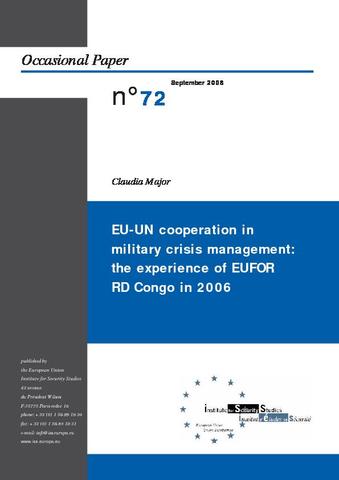You are here
EU-UN cooperation in military crisis management: the experience of EUFOR RD Congo in 2006

This paper explores the effectiveness of EU-UN cooperation in the area of military crisis management. Since the EU carried out its first autonomous military operation in 2003 in the Democratic Republic of Congo, it has increasingly engaged in military crisis management. In this context, the EU seeks cooperation with the UN, as a recognised moral and legal authority in international relations. The UN, facing a growing number of increasingly complex crises, seeks material support in order to carry out its tasks.
While both the EU and the UN support this cooperation, the output seems rather unsatisfactory. This paper examines why the results of such cooperation should be so ambiguous given both organisations’ insistence on its significance.
The issue is of both political and strategic relevance to the EU. Looking at the 2006 EU military operation EUFOR RD Congo and its cooperation with the UN mission already in the field, MONUC, the paper analyses the political, institutional and operational functioning of EU-UN cooperation in three categories: political, strategic and operational planning; cooperation in the field; and support and logistics.
Particular settings at the political and organisational levels trickle down to cooperation in the field, and affect the ability to jointly achieve the mission objectives. Complex institutional setting and procedures, different political agendas and a lack of understanding with regard to the objectives, capacities and the functioning of the partner institution affect the planning and conduct of operations.
The study provides an analysis of both the limits and opportunities of EU-UN cooperation and puts forward policy recommendations for improvement, particularly at the working/operative level.